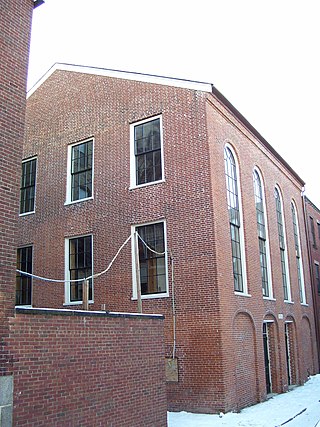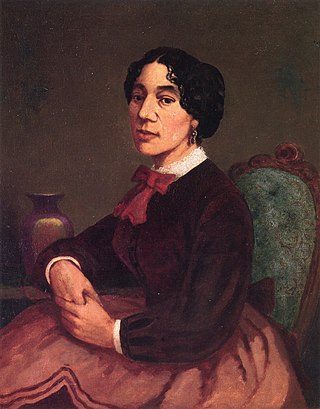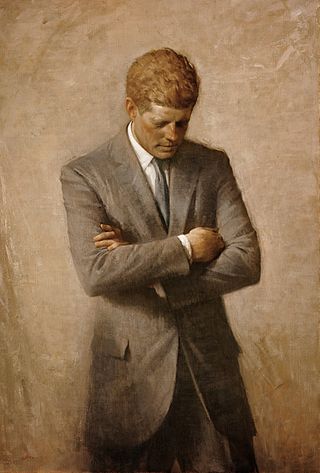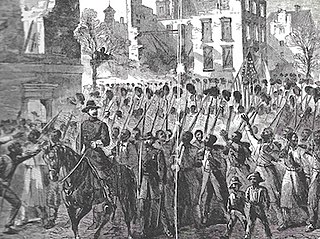Related Research Articles

Jacqueline Lee Kennedy Onassis was an American socialite, writer, photographer, and book editor who served as the first lady of the United States from 1961 to 1963, as the wife of President John F. Kennedy. A popular first lady, she endeared the American public with her devotion to her family, dedication to the historic preservation of the White House, the campaigns she led to preserve and restore historic landmarks and architecture along with her interest in American history, culture and arts. During her lifetime, she was regarded as an international icon for her unique fashion choices, and her work as a cultural ambassador of the United States made her very popular globally.

The 54th Massachusetts Infantry Regiment was an infantry regiment that saw extensive service in the Union Army during the American Civil War. The unit was the second African-American regiment, following the 1st Kansas Colored Volunteer Infantry Regiment, organized in the Northern states during the Civil War. Authorized by the Emancipation Proclamation, the regiment consisted of African-American enlisted men commanded by white officers.

Robert Gould Shaw was an American officer in the Union Army during the American Civil War. Born into a Boston upper class abolitionist family, he accepted command of the first all-black regiment in the Northeast. Supporting the promised equal treatment for his troops, he encouraged the men to refuse their pay until it was equal to that of white troops' wage.

I Am Curious (Yellow) (Swedish: Jag är nyfiken – en film i gult, meaning "I Am Curious: A Film in Yellow") is a 1967 Swedish erotic drama film written and directed by Vilgot Sjöman, starring Sjöman and Lena Nyman. It is a companion film to 1968's I Am Curious (Blue); the two were initially intended to be one 3+1⁄2 hour film.
Josephine St. Pierre Ruffin was a publisher, journalist, civil rights leader, suffragist, and editor of the Woman's Era, the first national newspaper published by and for African-American women.

William Garfield Greaves was an American documentary filmmaker and a pioneer of film-making. After trying his hand at acting, he became a filmmaker who produced more than two hundred documentary films, and wrote and directed more than half of these. Greaves garnered many accolades for his work, including four Emmy nominations.

George Luther Stearns was an American industrialist and merchant in Medford, Massachusetts, as well as an abolitionist and a noted recruiter of black soldiers for the Union Army during the American Civil War.

The African Meeting House, also known variously as First African Baptist Church, First Independent Baptist Church and the Belknap Street Church, was built in 1806 and is now the oldest black church edifice still standing in the United States. It is located in the Beacon Hill neighborhood of Boston, Massachusetts, adjacent to the Black American Abiel Smith School. It is a National Historic Landmark.

Archibald Henry Grimké was an African American lawyer, intellectual, journalist, diplomat and community leader in the 19th and early 20th centuries. He graduated from freedmen's schools, Lincoln University in Pennsylvania, and Harvard Law School and served as American Consul to the Dominican Republic from 1894 to 1898. He was an activist for rights for blacks, working in Boston and Washington, D.C. He was a national vice-president of the National Association for the Advancement of Colored People (NAACP), as well as president of its Washington, D.C. branch.

William Stanley Beaumont Braithwaite was an African-American writer, poet, literary critic, anthologist, and publisher in the United States. His work as a critic and anthologist was widely praised and important in the development of East Coast poetry styles in the early 20th century. He was awarded the Spingarn Medal in 1918.

Alfred R. Kelman is an American film and television documentary producer and director best known for his work on The Body Human and the 1984 television version of A Christmas Carol starring George C. Scott.
John van Salee de Grasse (1825–1868) was the first African American to be formally educated as a doctor in the United States, studying first at the Oneida Institute and then getting his degree from Bowdoin College's medical school. He set up his practice in Boston, Massachusetts, where he was the first African American to become a member of the Massachusetts Medical Society. Born in New York City, he was of multiracial ancestry: his father was born in Calcutta of Indian-French parentage and educated by his father in France, and his mother's family was African American with more distant Dutch, German and Moroccan ancestors.

The Memorial to Robert Gould Shaw and the Massachusetts Fifty-Fourth Regiment is a bronze relief sculpture by Augustus Saint-Gaudens opposite 24 Beacon Street, Boston. It depicts Colonel Robert Gould Shaw leading members of the 54th Regiment Massachusetts Volunteer Infantry as it marched down Beacon Street on May 28, 1863 to depart the city to fight in the South. The sculpture was unveiled on May 31, 1897. This is the first civic monument to pay homage to the heroism of African American soldiers.

Christiana Carteaux Bannister was an American business entrepreneur, hairdresser, and abolitionist in New England. She was known professionally as Madame Carteaux. Christiana was married to successful artist Edward Mitchell Bannister, who she supported financially during the early stages of his career. While Christiana's legacy has been overlooked in the past, coverage of her work in popular sources during the late 2010s has brought new attention to her success and political efforts.

Cultural depictions of John F. Kennedy, the 35th American president, include films, songs, games, toys, stamps, coins, artwork, and other portrayals.
Until 1950, African Americans were a small but historically important minority in Boston, where the population was majority white. Since then, Boston's demographics have changed due to factors such as immigration, white flight, and gentrification. According to census information for 2010–2014, an estimated 180,657 people in Boston are Black/African American, either alone or in combination with another race. Despite being in the minority, and despite having faced housing, educational, and other discrimination, African Americans in Boston have made significant contributions in the arts, politics, and business since colonial times.

The 55th Massachusetts Infantry Regiment was the sister regiment of the renowned Massachusetts 54th Volunteers during the latter half of the American Civil War. The enactment of the Emancipation Proclamation by United States President Abraham Lincoln on January 1, 1863 opened the way for the enlistment of free men of color and newly liberated slaves to fight for their freedom within the Union Army. As the ranks of the 54th Massachusetts quickly reached its full complement of recruits, an overflow of colored volunteers continued to pour in from several other states outside Massachusetts — many of whom simply had not arrived in time — prompting Governor John Albion Andrew to authorize yet another regiment of colored soldiers sponsored by the Commonwealth. Lieutenant Colonel Norwood P. Hallowell of the 54th Massachusetts was promoted to colonel and appointed commander of the 55th Massachusetts on May 30, 1863. Five companies of the 55th Massachusetts were mustered into service on May 31; two more companies were mustered in on June 15; and the last three on June 22.
Beth Harrington is an Emmy-winning, Grammy-nominated filmmaker based in Vancouver, Washington, specializing in documentary features. Her documentaries often explore American history, music and culture, including the Carter Family and Johnny Cash, and the history of women in rockabilly. In addition to her film work as a producer, director and writer, Harrington is also a singer and guitarist, and was a member of Jonathan Richman and the Modern Lovers from 1980 to 1983.
Woman Alive! was a feminist television show resulting from a collaboration between Ms. Magazine and American public television. It consisted of one pilot episode (1974) and two series.
The Lincoln School for Nurses, also known as Lincoln Hospital and Nursing Home School for Nurses, and Lincoln Hospital School of Nursing, was the first nursing school for African-American women in New York City. It existed from 1898 to 1961. It was founded by Lincoln Hospital in Manhattan. The hospital and nursing school, moved to 141st Street, between Concord Avenue and Southern Boulevard in Mott Haven, the South Bronx, after 1899.
References
- ↑ "Jacqueline Shearer, Documentary Maker, 46". The New York Times. 27 November 1993.
- ↑ "A Minor Altercation — Black Film Archive". blackfilmarchive.com.
- 1 2 3 4 "archives.nypl.org -- Jackie Shearer papers". archives.nypl.org.
- 1 2 Davis, Zeinabu Irene (Summer 1994). "Jackie Shearer (1946-1993)". Black Camera. 9 (1). ProQuest 1309145397.
- ↑ https://www.worldcat.org/title/180158089